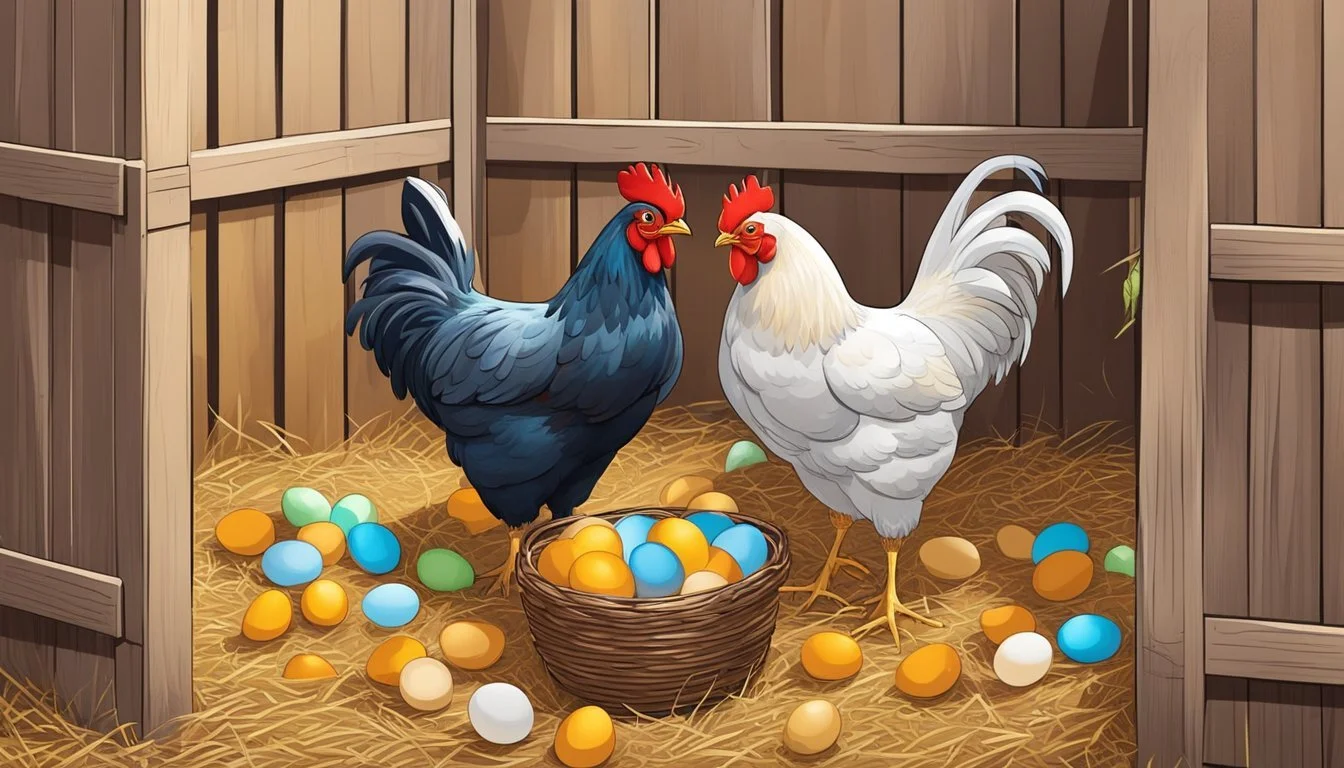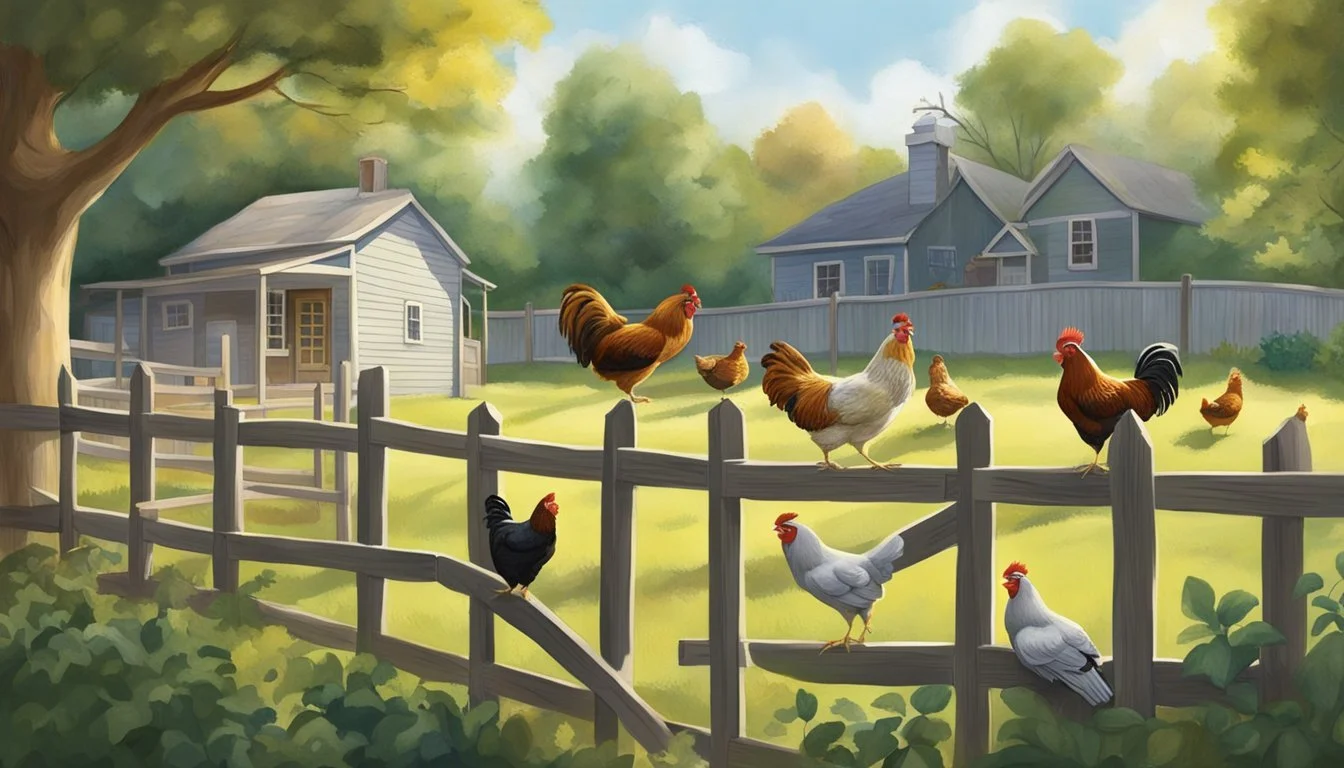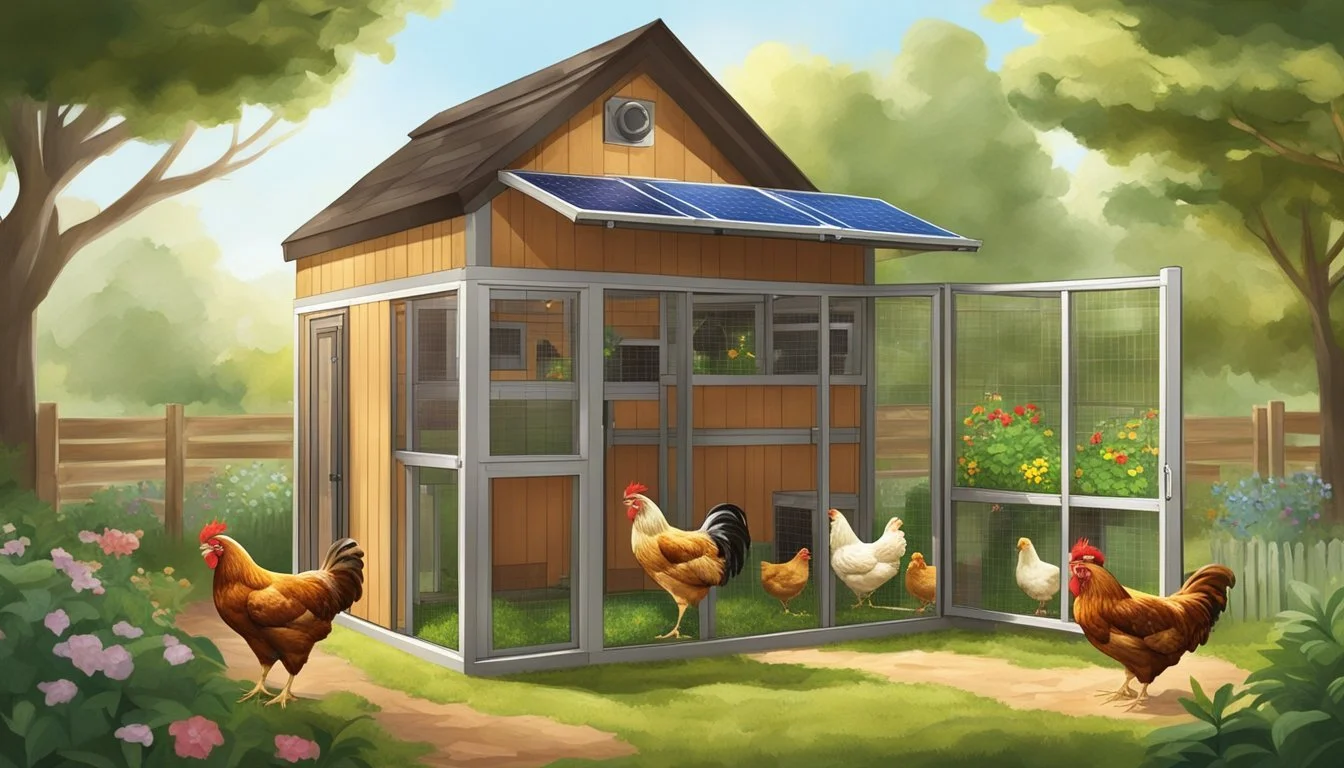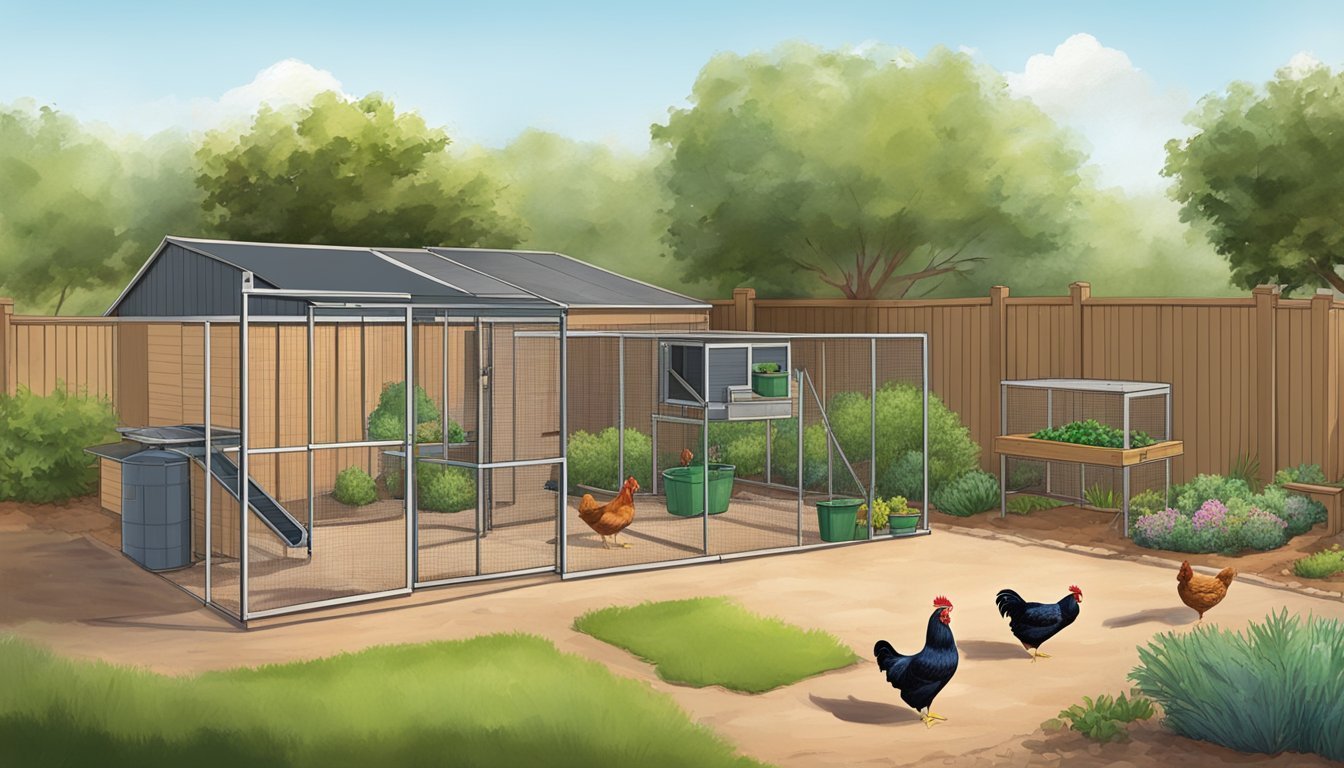Keeping Backyard Chickens in Peoria, AZ
Essential Guidelines for Beginners
Backyard chickens are becoming an increasingly popular choice for residents in Peoria, Arizona, seeking a more sustainable lifestyle and a personal source of fresh eggs. Peoria's municipal code accommodates the keeping of chickens in residential areas, allowing homeowners to engage in this form of urban agriculture. With the right preparation and adherence to local regulations, individuals can integrate this agrarian pursuit into their daily lives.
Maintaining a backyard flock, however, requires knowledge of Peoria's specific requirements to ensure that chickens contribute positively to the neighborhood environment. Detailed guidelines regarding the location of coops, the number of chickens permitted, and the overall management of the flock are set forth to prevent nuisances such as noise, odors, or the attraction of pests. It's crucial for potential and existing chicken keepers to familiarize themselves with these rules to foster a harmonious coexistence with their community.
Furthermore, the harsh climate of Arizona presents unique challenges for raising chickens. Animal housing must be designed to shield chickens from extreme temperatures prevalent in the region, providing adequate shelter, ventilation, and access to water. By addressing these needs, residents can ensure the health and safety of their backyard chickens while enjoying the rich rewards of keeping poultry in an urban setting.
Understanding Local Regulations
When considering the venture of keeping backyard chickens in Peoria, Arizona, it’s crucial to be well-informed about the local laws that govern such activities. Understanding the city and county ordinances will ensure compliance and facilitate a smoother experience in raising backyard poultry.
General City and County Ordinances
In Arizona, zoning laws vary by location, impacting the legalities of keeping backyard chickens. While permits may not be universally required, it's important to contact the local zoning office to confirm any zoning problems or specific guidelines. Residents should be aware that different counties or cities may have distinct ordinances. Generally, these ordinances address the number of chickens allowed, ban or regulate the keeping of roosters due to noise concerns, and stipulate requirements for enclosures to maintain cleanliness and animal welfare.
Specific Rules for Keeping Chickens in Peoria
Within the city of Peoria, chickens are allowed in residential areas, subject to certain rules. These rules may be influenced by factors such as lot size and location within the city. It is not uncommon for cities like Peoria to restrict the number of chickens that can be kept on a property and require enclosures to be well-maintained and a certain distance from neighbors' dwellings to prevent nuisances. Moreover, while roosters may be prohibited or their presence strictly controlled within city limits due to potential noise issues, homeowners in Peoria should verify these details with the city’s chicken ordinance. Fees and licenses could additionally apply and must be confirmed with Peoria’s regulations. Always double-check with the Peoria zoning office for the most current regulations and any necessary permits or licenses before starting your backyard flock.
Selecting Your Chickens
When embarking on the journey of raising backyard chickens in Peoria, AZ, understanding the significance of breed selection and flock dynamics is critical. One must consider the environment, space, and personal goals for their flock to ensure a thriving backyard endeavor.
Choosing the Right Breed
In Peoria, the selection of chicken breeds should be tailored to the hot Arizona climate and the size of the available space. Popular breeds that thrive in this environment include:
Rhode Island Reds: Known for their hardiness and egg-laying capabilities, making them an excellent choice for beginners.
Australorps: Esteemed for their high egg production and calm demeanor, plus their shiny black plumage offers some heat resistance.
Naked Neck: A unique breed with a featherless neck and less overall plumage, which helps them stay cooler in the heat.
When selecting a breed, one must consider the following factors:
Heat tolerance: All chickens need shade and water, but some breeds tolerate heat better.
Purpose: Decide if the flock is for egg production, meat, or as pets.
Temperament: Some breeds are friendlier and better suited to families.
Egg production: Different breeds lay varying quantities of eggs.
Understanding Flock Dynamics
Chickens are social creatures with intricate flock dynamics. Introducing multiple breeds into a backyard setting can lead to a pecking order, which is a hierarchical system that chickens use to establish social standing. Each breed brings its own traits to the flock's social behavior:
Rhode Island Reds may be more assertive and develop into flock leaders.
Australorps tend to be gentle, which sometimes puts them in the middle of the pecking order.
Naked Necks are often hardy and can hold their own in a mixed flock.
One should be aware of these dynamics to prevent bullying and ensure a harmonious environment. It's important to have ample space for the chickens to interact, forage, and retreat when necessary. Adequate space and environmental enrichment can alleviate many social stressors in a flock.
Designing Your Chicken Coop
When designing a chicken coop in Peoria, AZ, it's crucial to ensure adequate space and robust protection against predators and the elements to provide a safe and healthy environment for the chickens.
Size and Space Requirements
The first consideration for a chicken coop is providing enough space. Each chicken requires at least 3 to 4 square feet inside the coop and 8 to 10 square feet in the outdoor run. Spacing is key to preventing overcrowding, which can lead to health issues and aggressive behavior. Make sure to plan for:
Coop: Minimum space for a small flock (3-4 chickens) is 12 square feet.
Run: An attached run should offer ample space for movement, with a minimum of 32 square feet for a small flock.
Protection from Predators and Weather
Chickens must be protected from predators such as coyotes, hawks, and other wildlife common to Arizona. The coop should have:
Sturdy Walls: Use hardware cloth instead of chicken wire to reinforce the coop, which is more durable against predators.
Secure Flooring: Consider burying the wire around the perimeter and underneath to prevent digging.
Weatherproofing is equally essential. The coop should provide shelter from the intense Arizona sun and heat while also ensuring ventilation for air circulation. Coop design elements might include:
Roofing: A weather-resistant roof to shield from sun and rain.
Insulation: Proper insulation can help maintain a stable temperature inside the coop.
Ventilation: Windows or vents can be included for airflow but should be covered with predator-proof mesh.
By adhering to these guidelines, the chicken coop will be a safe and comfortable home for backyard chickens.
Daily Care and Feeding
Proper nutrition and hydration are fundamental to backyard chicken well-being. In Peoria, AZ, chicken enthusiasts should prioritize a balanced diet and a consistent water supply for their flock's health and productivity.
Feeding Your Chickens the Right Diet
Chickens require a balanced diet that includes sufficient proteins, carbohydrates, vitamins, and minerals. It is essential to provide them with a variety of feed that caters to their nutritional needs.
Starter and Grower Feed:
Chicks (0-6 weeks): Starter feed containing 18-20% protein.
Young chickens (6-20 weeks): Grower feed with reduced protein about 16-18%.
Layer Feed:
Adult laying hens: Layer feed consisting of about 16% protein and added calcium to support eggshell formation.
Supplemental Feed and Treats:
Offer grains, garden scraps, and occasional bugs or worms for additional nutrition.
It is important to avoid overfeeding treats to avoid nutrient imbalances.
Maintaining Water Supply
A constant, clean water supply is vital for chickens, as they need to hydrate frequently throughout the day.
Waterers:
Utilize clean, accessible waterers that prevent spillage and contamination.
In hotter months, check waterers multiple times a day to ensure they remain filled and clean.
It is recommended to clean waterers regularly to prevent the spread of disease. Providing ample water helps chickens digest food and regulate body temperature, which is crucial in Arizona's climate.
Health and Well-being
Maintaining the health and well-being of backyard chickens in Peoria, AZ involves proactive measures to prevent diseases and parasites, and ensuring regular veterinary care for routine check-ups.
Preventing Diseases and Parasites
Disease prevention in backyard chickens starts with sanitation and proper coop management. Routinely cleaning the coop and providing fresh water and food can greatly minimize the risk of diseases like Salmonella and Avian Influenza. It's important to:
Clean and disinfect feeders and waterers weekly.
Manage waste efficiently to prevent fly and rodent attraction.
Isolate new or sick birds to prevent the spread of disease.
Monitoring for parasites, such as mites and lice, involves:
Regular visual inspections of your chickens' feathers and skin.
Applying approved parasiticides if an infestation is detected.
Routine Check-ups and Care
Consistent health checks by a veterinarian should be part of the care schedule for your backyard chickens. These checks can identify health issues before they become serious problems. Key practices include:
Scheduling annual check-ups with a veterinarian who specializes in poultry.
Monitoring for signs of illness, like changes in eating habits or egg production.
Providing appropriate vaccinations as recommended by the veterinarian.
A focus on preemptive care and regular veterinary visits ensures the sustained health and productivity of your chickens, protecting both animal welfare and public health.
Dealing with Eggs
In Peoria, Arizona, keeping backyard chickens means ensuring the safety and quality of the eggs produced. Vigilance in collecting and understanding the habits of egg layers aids in maintaining a healthy flock and a fresh egg supply.
Collecting and Handling Eggs Safely
When collecting eggs, timing and care are crucial. Egg layers typically lay in the morning, so collecting eggs early ensures they are as fresh as possible. Using a basket or container during collection prevents eggs from cracking. Once gathered, eggs should be:
Cleaned cautiously: Wipe off any dirt using a dry cloth or sandpaper. If eggs are very dirty, they can be washed with water just warmer than the egg's temperature and air-dried.
Inspected thoroughly: Check for cracks or unusual textures and separate any flawed eggs from the rest.
Stored properly: Store eggs in a refrigerator at or below 40°F (4°C), with the pointed ends facing down to maintain the yolk's position and freshness.
It is essential to minimize the risk of Salmonella contamination. Handwashing before and after handling eggs and maintaining clean nesting areas reduce this risk significantly.
Understanding Egg-Laying Habits
Egg layers in Peoria have individual laying patterns, but most healthy hens will lay an egg almost daily. Factors influencing laying frequency include:
Light exposure: Hens require about 14 hours of daylight to sustain regular laying cycles.
Age: Egg production peaks during the first year and gradually decreases thereafter.
Diet: A diet rich in protein and calcium supports consistent egg production.
Monitoring these factors helps ensure a consistent supply of fresh eggs. It’s also beneficial to familiarize oneself with a flock's particular breed characteristics, as different breeds have varying egg-laying capabilities.
Community Relationships
When keeping backyard chickens in Peoria, AZ, it is essential to maintain positive relationships within the community. This involves managing noise and smell effectively and adhering to legal compliance while practicing good neighborly etiquette.
Managing Noise and Smell
Noise from backyard chickens, particularly from roosters, can lead to tensions with neighbors. Peoria's local laws may require chickens to be kept a certain distance away from neighbors' homes to minimize disturbances. Homeowners should:
Select hens since they are quieter and are usually allowed, while roosters are often restricted.
Construct sound-proofing barriers or plant vegetation to serve as natural noise buffers.
Odor control is vital in preventing complaints related to manure. Homeowners should:
Regularly clean the coop to prevent the accumulation of manure.
Implement a waste management system that adequately disposes of or composts chicken waste.
Legal Compliance and Neighborly Etiquette
Complying with local laws is critical to avoid legal issues. Homeowners in Peoria must understand the regulations concerning lot size, coop placement, and the number of chickens allowed. They should:
Obtain relevant permits if required by the city.
Ensure their chicken-keeping practices do not become a public nuisance by causing odors, attracting pests, or creating noise that exceeds acceptable levels.
Practicing good neighborly etiquette can mitigate potential complaints and foster a harmonious community. Homeowners should:
Communicate their intentions with neighbors and be responsive to their concerns.
Offer fresh eggs as a gesture of goodwill, which can encourage positive perceptions of backyard chickens.
By focusing on these aspects, individuals can enjoy the benefits of keeping backyard chickens while sustaining amicable relationships with their community in Peoria, AZ.
Sustainability Practices
Keeping backyard chickens in Peoria, AZ not only provides fresh eggs but also contributes positively to sustainable living practices through efficient waste management and agricultural integration.
Utilizing Chicken Manure for Compost
Chicken manure is a valuable by-product that can be turned into nutrient-rich compost. By composting manure, one can create a natural fertilizer that enriches the soil without the need for chemical alternatives. It's advisable to allow the manure to compost for at least six months before applying it to gardens to prevent burning plants with the high nitrogen content.
Composition of Chicken Manure:
Nitrogen (N)
Phosphorus (P)
Potassium (K)
The process involves layering dry materials like straw or leaves with manure and regularly turning the pile to speed up decomposition. This practice not only recycles waste but also enhances soil health and fertility.
Integrating Chickens into Home Agriculture
Chickens can play a crucial role in a home agriculture system. They contribute to pest control by consuming common bugs and insects that are harmful to crops. Moreover, chickens provide a natural method for weed management, as they feed on various unwanted plant species.
Benefits to Home Agriculture:
Reduction in pest populations
Natural weed control
Contribution to soil aeration and fertility
Incorporating a pasture-rotation method allows chickens to graze on different areas, which helps to evenly distribute their manure, boosting the soil fertility in various sections of a garden or farm over time. This technique not only sustains land productivity but also provides chickens with a variety of natural foods, contributing to their overall health and the quality of meat and eggs produced.
Navigating Common Challenges
Keeping backyard chickens in Peoria, AZ presents specific challenges, mainly in dealing with predators and adhering to local zoning laws. This section will guide you through these issues with practical solutions.
Dealing with Predators and Pests
In Peoria, backyard chicken keepers must ensure their flocks are protected from common predators such as coyotes, hawks, and neighborhood dogs. Secure enclosures are critical:
Enclosures: Construct a well-fortified coop with wire mesh that extends underground to prevent digging predators. The coop must also have a robust roof to counter flying predators.
Sanitation: Regularly clean the coop to prevent pests like flies, mosquitoes, and rodents that can spread diseases.
Addressing Zoning and Space Issues
Compliance with Peoria's zoning regulations is mandatory for chicken enthusiasts to avoid legal issues:
Zoning Office Consultation: Consult the local zoning office to understand the specific limits on the number of chickens allowed, which is up to six hens without roosters on a residential lot.
Space Considerations: Backyard chickens require sufficient space, not only to fulfill legalities of 20 feet from property lines and 40 feet from neighboring dwellings but also to ensure their overall health and wellbeing.
For residents of apartments or condos, it's normally not viable to keep chickens due to space constraints and the close proximity of neighbors, which can cause disturbances and sanitation issues.
Additional Resources and Support
Individuals keeping backyard chickens in Peoria, Arizona, have access to a variety of resources and support systems that cater to the needs of both novice and experienced poultry keepers. These resources help provide important information on the care, feeding, and local regulations concerning backyard poultry.
Local Peoria and Arizona Resources
Within Peoria and the broader Arizona region, enthusiasts can find physical locations offering supplies and advice. Feed stores in Peoria are knowledgeable and stocked with the necessary nutrition and equipment for poultry. These stores often provide insight into local agricultural practices and connect customers with larger networks in the cities of Phoenix, Tempe, Tucson, and Scottsdale. Local cooperative extensions, such as the one associated with The University of Arizona, serve as a vital educational outlet, offering workshops and science-based information to poultry owners.
Online Communities and Forums
Online resources play a crucial role in supporting backyard chicken keepers. Numerous online communities and forums offer a platform for sharing experiences, solving common problems, and obtaining advice. These virtual spaces enable people from Peoria and neighboring areas to engage with a larger community support system that extends beyond Arizona's borders, offering a wealth of collective knowledge accessible from anywhere.
Popular Online Forums:
BackYard Chickens
Chicken Forum
The Easy Chicken for Beginners
Online forums often comprise experienced poultry enthusiasts from diverse locations who can offer support on a range of topics, from local regulations to disease management. These forums are open for anyone, whether they are from Peoria, Phoenix, or anywhere in the world, fostering a sense of community and shared learning.











